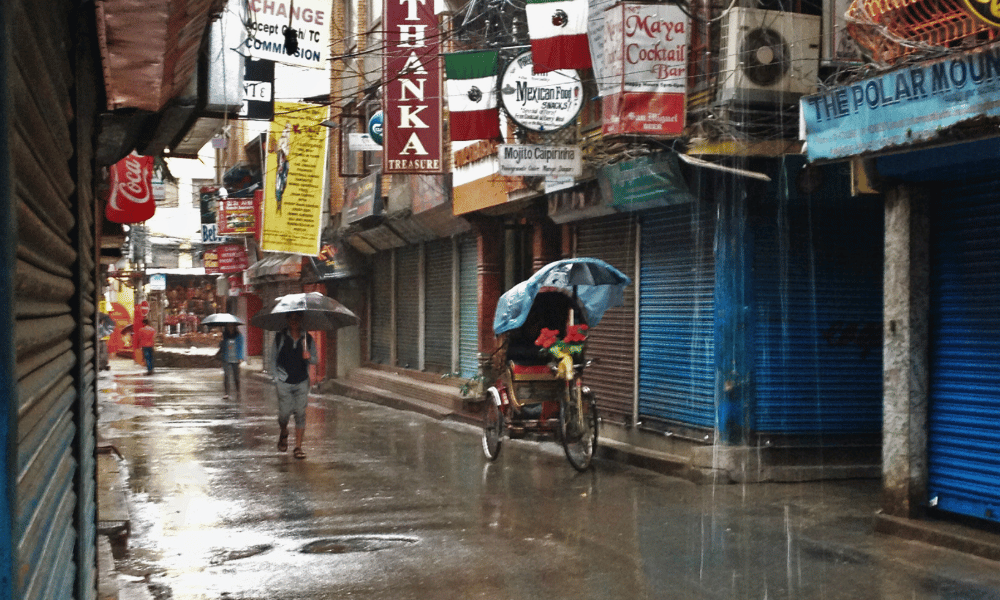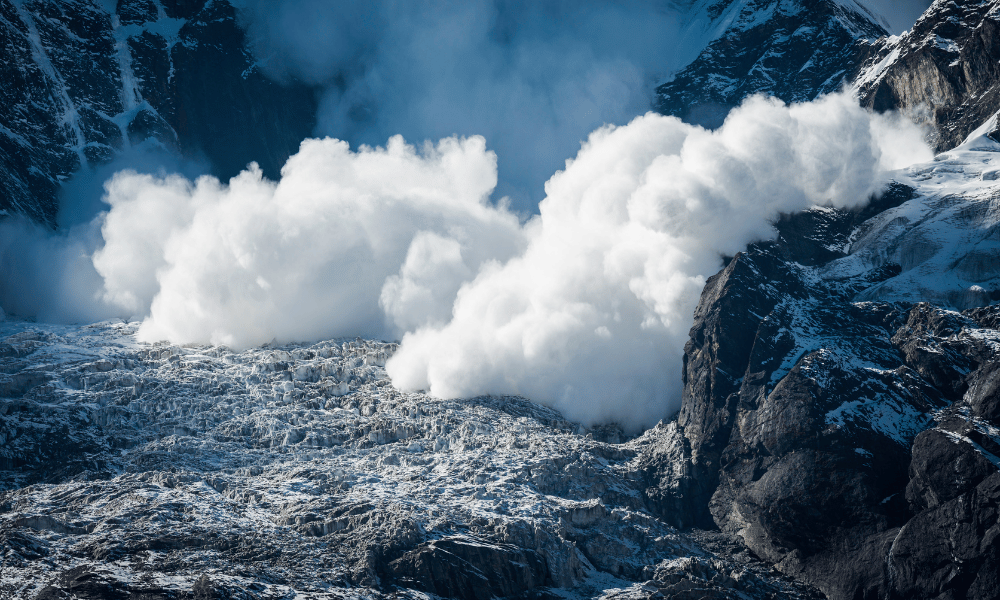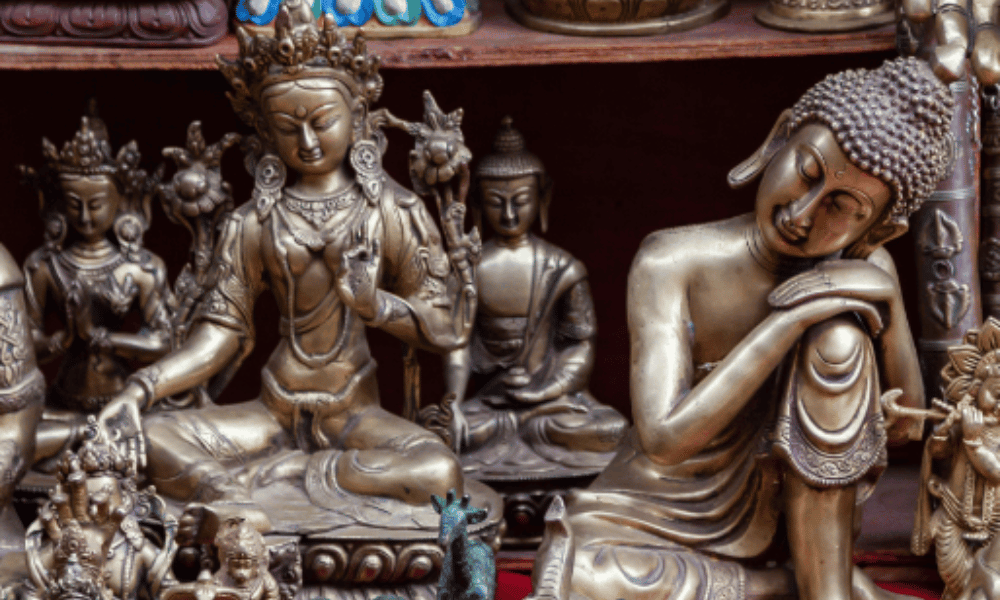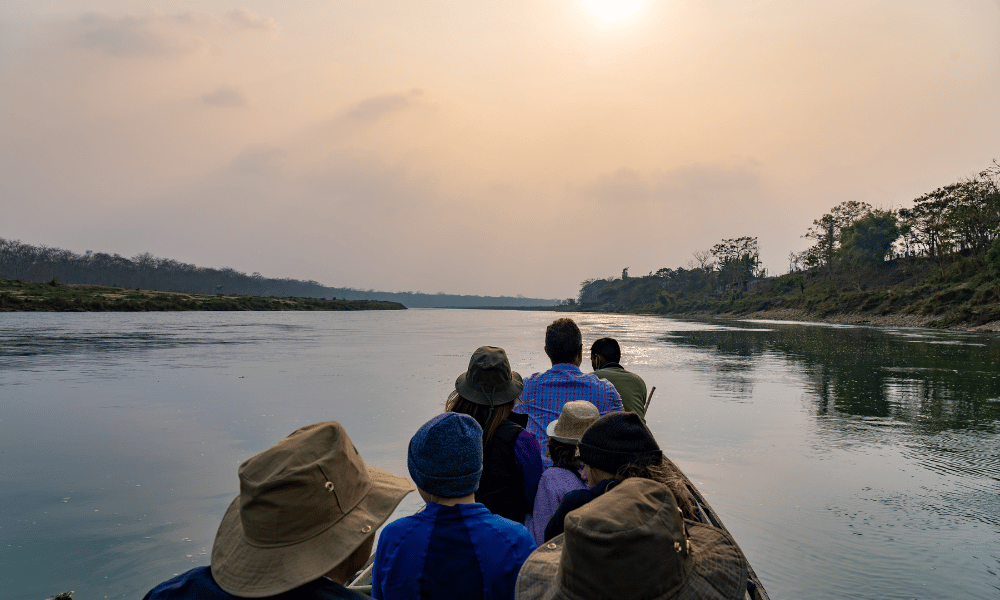Is Nepal Safe To Travel?
You can enjoy your time in Nepal with peace of mind, knowing that you are taking measures to ensure your personal safety and protect your belongings.
You can enjoy your time in Nepal with peace of mind, knowing that you are taking measures to ensure your personal safety and protect your belongings.


Picture yourself standing amidst the towering Himalayas, breathing in the crisp mountain air, and immersing yourself in the vibrant tapestry of cultures and spirituality in Nepal. But amidst the allure of Nepal's treasures, a question tugs at your senses: Is Nepal truly a safe haven for explorers like yourself? Fear not, for we are here to unravel the safety tapestry and set your worries to rest, allowing you to embark on a thrilling journey like no other.
Nepal is a country that captivates the imagination with its breathtaking landscapes, ancient temples, and rich cultural heritage. However, as with any travel destination, it is crucial to consider safety as a top priority. By understanding the safety measures in place and being aware of potential risks, you can fully immerse yourself in the wonders of Nepal and make the most of your adventure.
This article aims to provide you with a detailed overview of the safety considerations involved in traveling to Nepal. We will explore various aspects, including political stability and security, the tourist-friendly environment, disaster preparedness, trekking and adventure sports safety, health and medical facilities, and personal safety. Examining these areas will give you valuable insights that will help you navigate Nepal with confidence and peace of mind.
So, dear adventurer, let your wanderlust soar as we embark on a captivating journey through the safe realms of Nepal. Together, we will unravel the safety queries about Nepal and ignite a flame of excitement that will guide you to the hidden wonders of this extraordinary destination. Get ready to lose yourself in the charm of Nepal, where safety and allure converge to create an experience that will stay with you long after you leave its magical embrace.
When considering travel to any destination, understanding the general perception of safety is crucial. Nepal often garners positive reviews from travelers in terms of safety. The country has become a popular destination for adventurers, trekkers, and spiritual seekers alike. Visitors often speak highly of the warm hospitality, friendly locals, and sense of security they experience during their time in Nepal.
Nepal has made significant progress in enhancing safety measures and promoting a secure environment for tourists. The government and local authorities are actively involved in implementing safety protocols, particularly in popular tourist areas. Visible security presence can often be observed, contributing to a reassuring atmosphere.
It is worth noting that staying updated on travel advisories from respective governments and consulting with reliable travel agents or tour operators can provide valuable insights into the current safety situation in Nepal. The perception of safety can vary among individuals, but by staying informed, using common sense, and respecting local customs and traditions, travelers can have a safe and enriching experience in Nepal.
When exploring the captivating landscapes of Nepal, it's important to prioritize your physical safety. The country's diverse terrain and unique environmental conditions can present certain challenges. By understanding and addressing these concerns, you can ensure a safe and enjoyable travel experience.
Navigating Nepal's roads can be an exhilarating journey, but it's crucial to be aware of potential challenges. Road conditions vary across the country, and driving standards may differ from what you're accustomed to. It's common to encounter traffic congestion, narrow mountainous roads, and unpredictable driving behaviors. To ensure your safety on the road:
Opt for reputable transportation services with experienced drivers who prioritize safety.
Whenever possible, wear your seatbelt to reduce the risk of injuries.
Stay alert and cautious when crossing roads, particularly in busy urban areas.
Nepal's geographical location exposes it to various natural disasters and weather conditions. While the occurrence of such events is rare, it's essential to be prepared and informed. Some potential safety concerns include:
Earthquakes: Nepal lies in a seismically active region. Even though big earthquakes are rare, it will be reassuring to familiarize yourself with emergency procedures and evacuation routes provided by your accommodation or trekking agency.
Landslides: In hilly and mountainous regions, landslides can occur during heavy rainfall or seismic activities. Stay updated on weather forecasts, especially during the monsoon season, and follow any warnings or advisories issued by local authorities.
Flooding: During the monsoon season, certain areas in Nepal may experience flooding. Stay informed about current weather conditions and avoid venturing into flood-prone regions.

Nepal's abundant wildlife offers the chance for exciting encounters, but it's important to exercise caution and respect their natural habitats. Here are some safety tips:
Maintain a safe distance from wild animals and never attempt to feed or approach them.
If you're planning activities in national parks or wildlife reserves, follow the guidance of experienced guides, and park authorities.
Educate yourself about the behaviors and habits of the wildlife you may encounter to avoid any unintended confrontations.
By being aware of these common safety issues and following these tips, you can minimize risks and enhance your overall travel experience in Nepal. Embrace the beauty of the landscapes, immerse yourself in the rich culture, and confidently go on unforgettable adventures, knowing that you've taken the necessary precautions to ensure your physical safety.
Preparing for Different Terrains:
Nepal's diverse landscapes present a range of terrains, from rugged mountain trails to bustling city streets. To ensure your physical safety and comfort:
Wear appropriate footwear suitable for the terrain you'll be traversing. Sturdy hiking boots are essential for trekking adventures.
Carry necessary gear such as rain jackets, layers for varying temperatures, and sun protection to stay comfortable in changing weather conditions.
Keeping Track of Weather Forecasts:
Nepal's weather can be unpredictable, especially in mountainous regions. Stay updated on weather forecasts to anticipate any changes in conditions. This will help you make informed decisions about your itinerary and ensure you're adequately prepared.
Understanding the Local Wildlife:
If you're venturing into Nepal's wilderness, it's important to familiarize yourself with the local wildlife. Learn about their behaviors and habits to avoid any unintended confrontations. Follow guidelines provided by park authorities or experienced guides to ensure your safety and minimize disturbance to the animals.
Maintaining good health is essential for an enjoyable and safe trip to anywhere. Like any country, Nepal presents some health risks, including food and water safety in rural areas and altitude sickness. However, by taking proper precautions such as staying hydrated, eating safely, and preparing for high-altitude treks, you can minimize these risks and ensure a healthy and memorable journey.
Food and water safety is essential to prevent gastrointestinal illnesses such as diarrhea, which can be common in rural Nepal due to poor sanitation and hygiene practices. To minimize the risk of illness, it's recommended to:
Drink only bottled or boiled water, even for brushing your teeth.
Avoid consuming raw fruits and vegetables that may have been washed in contaminated water.
Only eat well-cooked food and avoid street food or unhygienic food stalls.
Wash your hands regularly and thoroughly with soap and water or use alcohol-based hand sanitizer before eating or touching your mouth.
Altitude sickness, also known as acute mountain sickness, can occur when traveling to high elevations in Nepal, particularly during treks or climbs in the Himalayan region. Symptoms can range from mild headaches and dizziness to severe shortness of breath and confusion. To prevent altitude sickness, it's recommended to:
Take time to acclimatize to higher elevations by ascending slowly and allowing your body to adjust.
Stay hydrated by drinking plenty of water and avoiding alcohol and caffeine.
Avoid strenuous physical activity in the first few days at high altitudes.
Consider carrying medication such as acetazolamide to help prevent or treat altitude sickness, but only after consulting with a doctor.

Nepal is home to several vector-borne diseases such as dengue fever, malaria, and Japanese encephalitis. To prevent these diseases, it's recommended to:
Wear long-sleeved shirts and pants and use mosquito repellent when in areas with a high risk of mosquito bites.
Sleep under mosquito nets if you're staying in an accommodation without screens or air conditioning.
Consider taking preventative medication for malaria if you're traveling to high-risk areas in the Terai region during the monsoon season.
With the following health safety tips, you can minimize the risk of illness and enjoy your travels in Nepal with peace of mind. Remember to consult with a doctor before traveling, especially if you have pre-existing medical conditions or concerns.
1. Staying Hydrated and Eating Safely
Staying hydrated and eating safely is essential to maintaining good health while traveling in Nepal. To ensure safe drinking water, it's recommended to only drink bottled or boiled water and avoid ice cubes. When eating food, it's best to choose well-cooked meals and avoid street food or unhygienic food stalls. To maintain good hygiene, it's important to wash your hands regularly with soap and water or use alcohol-based hand sanitizer before eating or touching your mouth.
2. Preparing for High-Altitude Treks
If you're planning a high-altitude trek, it's essential to prepare your body to handle the physical demands and altitude. It's recommended to start training and preparing at least a few months in advance by doing regular exercise, including hiking or walking uphill. To acclimatize to higher elevations, take time to ascend slowly and allow your body to adjust. Ensure you have appropriate clothing and gear suitable for the climate and terrain.
3. Precautions for Vector-Borne Diseases
To prevent vector-borne diseases, it's recommended to wear long-sleeved shirts and pants and use mosquito repellent when in areas with a high risk of mosquito bites. Sleeping under mosquito nets is also recommended if you're staying in an accommodation without screens or air conditioning. If you're traveling to high-risk areas for malaria during the monsoon season, consider taking preventative medication after consulting with a doctor.
Ensuring personal safety and protecting your belongings is an important aspect of any travel experience. Here are some considerations for personal and belongings safety in Nepal:
Nepal has a relatively low crime rate, and most visitors have safe and incident-free trips. However, like in any destination, it's important to be aware of potential scams and take precautions. Common scams in Nepal can include overcharging for goods or services, fake tour operators, and pickpocketing in crowded areas. Being informed and vigilant can help you avoid falling victim to these scams.

While exploring Nepal's vibrant cities and natural landscapes, it's essential to keep your personal belongings secure. Carry a sturdy bag or backpack that can be closed securely and consider using a money belt or pouch to keep your valuables, such as passports, cash, and electronics, safe. Avoid displaying expensive items openly and be cautious when using public transportation or visiting generally crowded places.
You can enjoy your time in Nepal with peace of mind, knowing that you are taking measures to ensure your personal safety and protect your belongings. These tips will hopefully help you make informed decisions concerning your safety.
Respecting Local Customs and Laws: Familiarize yourself with the local customs and laws to show respect to the local culture and avoid any unintentional offenses. It's important to dress modestly, particularly in religious sites, and to be mindful of local customs and traditions.
Keeping Personal Belongings Secure: Always keep an eye on your belongings and avoid leaving them unattended. Use hotel safes or lockers when available to store valuable items. When traveling, consider using a reliable padlock for your luggage and securing your accommodation properly.
Being Cautious of Scams: Stay cautious and skeptical of unexpected offers or deals that seem too good to be true. Be wary of strangers who approach you with unsolicited assistance or information. It's advisable to book tours and activities through reputable travel agencies and to research and compare prices in advance to avoid being overcharged.
Above everything, remember to strike a balance between being cautious and embracing the warm hospitality and beauty of Nepal's diverse culture.
It is essential to be aware of the unique challenges that may arise for you and take necessary precautions for a worry-free journey. It's important to be prepared and informed to make the most of your trip. By taking some basic precautions and being mindful of local customs, you as a woman or a solo traveler, can experience the beauty and wonder of Nepal with confidence.
When it comes to women and solo traveler safety, understanding the local cultural norms and expectations is key. Dressing in a manner that respects these customs, especially in rural areas and religious sites, not only helps you blend in but also minimizes unwanted attention. While instances of serious harassment and safety issues are relatively low, it's always wise to stay connected and inform someone about your travel plans.
Regularly updating friends, family, or your accommodation staff about your whereabouts ensures that someone is aware of your location and can provide support if needed. Reliable accommodations play a crucial role in enhancing safety. Choose establishments with positive reviews and a reputation for prioritizing guest security. Opting for well-known tourist areas with established guesthouses or hotels adds an extra layer of assurance.
Transportation safety is another important consideration. Select licensed and reputable transportation services, particularly when traveling alone or at night. Utilize well-lit and populated areas, and when using taxis, prefer those with clear identification and meters. Trustworthy drivers contribute to your peace of mind as you navigate the streets of Nepal.
Connecting with local recommendations can significantly enhance your safety and enrich your travel experience. Seek advice from reputable tour operators, fellow travelers, or locals who can provide valuable insights into safe guides, drivers, or trekking agencies. Their knowledge and expertise will help you make informed decisions and forge unforgettable connections with the country.
Ultimately, trust your instincts and listen to your intuition. If a situation feels uncomfortable or unsafe, remove yourself from it and seek assistance from trusted sources, such as local authorities or your accommodation staff. Empower yourself with knowledge and resources to confidently explore Nepal's captivating landscapes, immerse yourself in its vibrant culture, and forge unforgettable memories on your solo journey.

Nepal has garnered a multitude of reviews and experiences from travelers, providing valuable insights into the safety aspects of visiting the country. These accounts offer a well-rounded perspective, showcasing both positive and negative experiences related to safety.
Positive experiences that often highlight the warm hospitality and friendliness of the Nepalese people, who go out of their way to ensure the safety and well-being of travelers. Many visitors have shared heartwarming stories of locals offering assistance and guidance, creating a sense of security and welcoming them into this captivating land. Additionally, travelers have praised the professionalism and expertise of local guides, particularly in trekking and adventure activities. These guides not only enhance the experience but prioritize safety by providing valuable insights and guidance throughout the journey.
While Nepal is generally considered safe, some travelers have reported isolated incidents of petty theft, scams, or pickpocketing in crowded tourist areas or on public transportation. It's important to remain cautious and take necessary precautions to keep personal belongings secure. Additionally, traffic conditions and driving practices in certain urban areas have raised concerns among some visitors, emphasizing the need for extra vigilance when navigating bustling streets.
It's crucial to approach reviews and experiences from other travelers with a balanced perspective. Every journey is unique, and perceptions of safety can vary. While minor safety issues may have been encountered by some, the majority of travelers have had overwhelmingly positive experiences exploring Nepal without major concerns.
To ensure a safe and enjoyable trip, it's recommended to conduct thorough research, seek advice from reputable sources, and make informed decisions based on personal preferences and comfort level. Engaging in conversations with fellow travelers, reading travel blogs, and consulting experienced tour operators can provide valuable insights into the local safety conditions.
As you embark on your Nepalese adventure, embrace a positive mindset, trust your instincts, and immerse yourself in the awe-inspiring landscapes and cultural wonders that Nepal offers. By staying informed, taking necessary precautions, and adopting an adventurous spirit, you can create unforgettable memories while feeling secure and protected throughout your journey.
As we conclude our exploration of the safety aspects of traveling to Nepal, it's evident that this enchanting country offers a remarkable blend of natural beauty, cultural richness, and warm hospitality. Throughout this blog, we have discussed various aspects of safety, from physical well-being to health precautions, personal and belonging safety, and cultural sensitivities. Now, let's summarize our findings and provide a personal perspective on whether Nepal is a safe destination for travelers.
Nepal, like any other travel destination, has its unique set of safety considerations. We have discussed the importance of being mindful of traffic and road conditions, preparing for natural disasters and weather fluctuations, and respecting the local wildlife. Additionally, we have highlighted the significance of health safety, especially regarding food and water precautions and acclimatization to high altitudes. Tips have been shared to ensure personal safety, protect belongings, and navigate cultural norms and expectations.
When it comes to personal safety, Nepal generally offers a safe environment for travelers. While isolated incidents of petty theft and pickpocketing may occur in crowded tourist areas, exercising caution and employing common-sense measures can minimize such risks. The warm and welcoming nature of the Nepalese people contributes to a sense of security and adds to the overall positive experience.
It's important to acknowledge that individual experiences may vary. While some travelers may have encountered certain unfortunate safety concerns, the majority have reported overwhelmingly positive experiences in Nepal. By staying informed, taking necessary precautions, and being mindful of the local customs and laws, travelers can enhance their safety and enjoy all that Nepal has to offer.
In our view, Nepal is a safe destination for travelers who exercise reasonable caution and follow the guidelines we have discussed. It presents an opportunity to immerse oneself in breathtaking landscapes, embark on thrilling adventures, and embrace a vibrant cultural heritage. The country's remarkable beauty and the genuine warmth of its people make it an inviting place to explore.
As you plan your journey to Nepal, we encourage you to stay informed through reputable sources, seek advice from experienced travelers or tour operators, and make informed decisions that align with your comfort level. Engage with the local culture, interact with fellow travelers, and embrace the spirit of adventure that Nepal embodies.
Remember, safety is a priority, but it should not hinder the joy of discovery and exploration. With a mindful and informed approach, you can create lasting memories and experience the wonders of Nepal with confidence and enthusiasm. So, pack your bags, embark on this remarkable journey, and let Nepal weave its magic on you. Safe travels!
our first-hand Himalayan travel experience